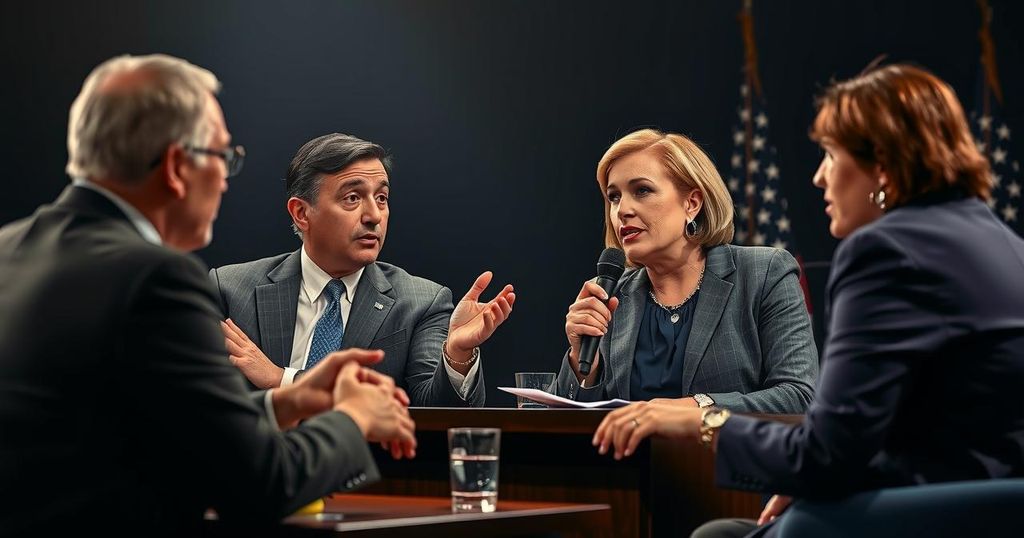Both major U.S. presidential candidates, Donald Trump and Kamala Harris, are adopting increasingly stringent positions on immigration, reflecting a broader global trend towards right-wing nativism. Trump emphasizes fears of illegal immigration as a threat to safety, while Harris has pledged to reinforce strict border controls. This shift marks a departure from traditional asylum protections and mirrors political dynamics seen in various European nations, indicating a widespread acceptance of severe immigration measures among mainstream political parties.
In the current political landscape, both leading U.S. presidential candidates are adopting increasingly hardline stances on immigration, mirroring a broader global shift toward nativism and restrictive immigration policies. Former President Donald Trump has centered his campaign on alarmist narratives of immigration, calling for what he terms the “largest deportation operation in the history of the United States” and asserting a need to “close the border” and halt the perceived invasion of undocumented migrants. His rhetoric includes stark warnings about the dangers posed by immigrants, which he claims threaten public safety. Conversely, Vice President Kamala Harris is matching Trump’s aggressive tone with her own promises for stricter immigration controls, despite her party’s traditional support for asylum rights. Harris has indicated her support for increasing the number of border enforcement agents and has previously endorsed a stringent border control bill. This alignment on immigration policies signals a significant shift for the Democratic Party, which has historically aimed to preserve refugee rights. Experts note that this hardening of immigration discourse is not confined to the United States. In European nations such as France and Germany, far-right parties have gained traction by exploiting fears related to immigration. Proposals for stricter immigration measures have emerged even from centrist governments as they respond to rising far-right sentiments. This political trend reflects a broader reluctance to uphold established asylum principles, as governments are increasingly sidestepping international norms in favor of stringent enforcement measures, driven largely by voter anxieties about immigration. Reports indicate that immigration has become a critical issue for American voters, ranking just behind economic concerns like inflation in importance. Historically, fears regarding immigration have been politicized. Previous campaigns, such as that of Pat Buchanan in 1992, similarly exploited xenophobic fears, but now these viewpoints are integrated into mainstream political rhetoric. The shift indicates a growing normalization of views once considered extreme, regardless of political affiliation. Amidst this turbulence, there remains a dangerous trend where mainstream parties feel compelled to adopt far-right narratives without sufficiently addressing the merits of inclusive immigration policies. This approach could undermine potential discussions surrounding the benefits of immigration and the moral obligations toward individuals seeking refuge from persecution. In summary, the U.S. immigration debate exemplifies a significant global rightward shift, characterized by heightened restrictions, fears of overpopulation by immigrants, and a diminishing commitment to the principles of asylum and refugee rights.
The immigration discourse in the United States is experiencing a pronounced shift toward the right, consonant with global trends where both conservative and liberal parties are increasingly adopting hardline policies. Immigration has become a pivotal issue in national politics, particularly in the context of an upcoming presidential election where candidates like Donald Trump and Kamala Harris espouse starkly contrasting yet similarly restrictive immigration policies. This shift reflects a transformation in public sentiment towards immigration, driven by fears of crime and economic decline, leading to a burgeoning acceptance of previously fringe sentiments regarding immigration policy. Experts identify this as part of a larger international movement where mainstream political discourse is heavily influenced by the far-right.
In conclusion, the evolving immigration debate highlights a global trend wherein both left and right political entities are increasingly embracing restrictive immigration policies. The significant shift in rhetoric among candidates like Donald Trump and Kamala Harris demonstrates a willingness to compromise on traditionally upheld asylum rights in response to voter concerns about immigration. This normalization of hardline views poses challenges to constructive dialogue surrounding the benefits of immigration and the protection of vulnerable populations. As political discourse continues to evolve, the imperative to reclaim a humane approach to immigration policy remains crucial for preserving human rights and fostering inclusive societies.
Original Source: www.aljazeera.com






